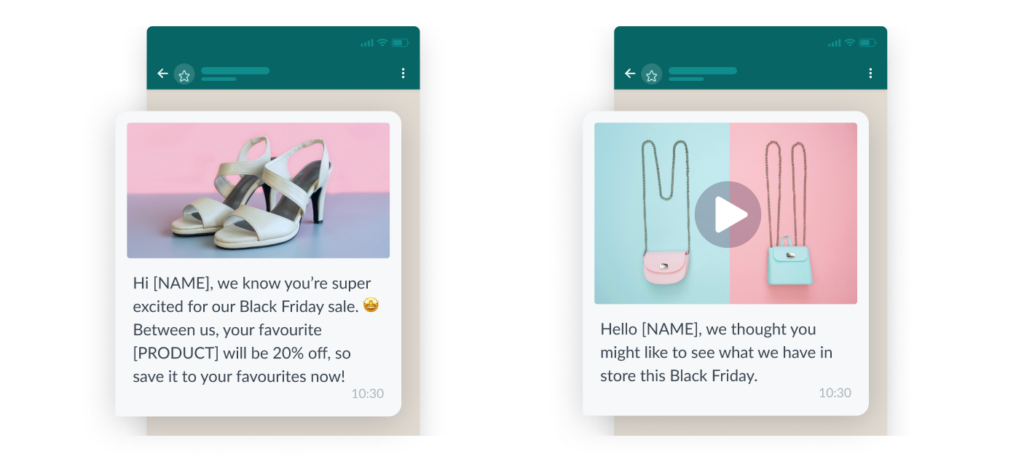
SMS and WhatsApp are two of the world’s biggest messaging channels. How do the two compare? Which is better for your business? Read on to find out more…
WhatsApp and SMS are two of the world’s biggest messaging channels. Considering 92% of the world own mobile phones and 86% own smartphones, both channels are extensive in their reach and boast impressive engagement rates.
But which one is better for your business? How do the two compare when it comes to marketing campaigns?
Here’s an overview of SMS vs WhatsApp and their pros and cons to help you decide on the best approach for your organisation.
Quick summary
- SMS works on any mobile phone, while WhatsApp requires an internet-connected smartphone.
- WhatsApp supports richer features, like branded profiles and multimedia content.
- Both channels boast high engagement rates (98% open rate for SMS and 99% for WhatsApp).
- SMS works well for simple, time-sensitive messages and alerts, while WhatsApp is better for interactive, engaging campaigns. Businesses can use a mix of both channels for maximum impact.
What is SMS?
Short Message Service, also known as SMS, is a service that allows for short text messages to be exchanged between mobile devices. Every mobile phone has the native ability to send SMS messages. All you need to be able to send and receive a text is a valid phone number and a mobile contract.
Because of its wide reach and high engagement rates, many businesses use SMS as a way to communicate with their audience for marketing campaigns and promotions.
Recommended: SMS Marketing: Unlock the Power of SMS
What is WhatsApp?
From a consumer’s perspective, WhatsApp is the free app that people use to stay in touch with friends and family – one-on-one or via group chats. You can send messages, voice notes, images, links, GIFs, documents, and have phone and video calls.
For businesses wanting to use WhatsApp to communicate with their audience, there are two options:
- WhatsApp Business – the free app that’s popular among small businesses (fewer than 10 employees) and used for ad-hoc customer service and micro marketing campaigns.
- WhatsApp Business Platform – the solution SMEs and larger businesses use for mass marketing and messaging campaigns, global customer service, and more.
Read about the different types of WhatsApp in our guide: WhatsApp vs WhatsApp Business Platform
Key differences: SMS vs WhatsApp
| SMS | |
| No need for an internet connection | Requires an internet connection – whether that’s mobile data or a WiFi connection |
| No need for a smartphone | Requires a smartphone |
| No need for an extra app – all phones come with built-in messaging capabilities | Requires an app to be downloaded |
| Average open rate is up to 98% and conversion rate is 29% | Average open rate is up to 99% and conversion rate is typically between 45 and 60% |
| Any industry can use SMS | Certain industries are prohibited from using the platform |
| 160 character count limit | 4,096 character count limit, which equates to around 500 words |
| Ability to have two-way conversations isn’t built in – you need a virtual mobile number | Two-way chats are available to every WhatsApp account. No virtual mobile number needed! |
| No end-to-end encryption – sensitive info should never be communicated via SMS | End-to-end encryption so sensitive info can be shared. |
| No authenticity checks | Meta will verify the authenticity of every business account on WhatsApp Business Platform |
| No branding | Branded profile, plus the opportunity to become an Official Business Account (green tick) |
| Can send rich content (a URL that links to a landing page), but it’s mostly plain text | Supports a rich messaging experience – send images, videos, interactive buttons within your messages and more. |
Operating requirements
Reliance on an internet connection
SMS is available to any device with a working mobile network connection. There’s no need for an internet connection.
WhatsApp, on the other hand, requires an active internet connection, whether that’s WiFi or mobile/cellular data. If your recipients experience internet issues, this can be challenging if you’re sending time-critical alerts via WhatsApp Business Platform.
Accessibility
Recipients must download the WhatsApp app if they’re going to receive messages via this platform. Not all mobile phones support WhatsApp – only smartphones do and even then, there are some older smartphones that no longer support the app.
SMS, however, does not require a smartphone. In fact, all mobile devices come with built-in messaging capabilities so there’s no need to download an app to receive SMS messages.
Which is better for engagement?
Compared to other channels, both SMS and WhatsApp boast high open and conversion rates.
For SMS, the average open rate is up to 98% and conversion rate is 29% compared to email’s 21% and 2%, respectively.
And WhatsApp Business Platform has one of the highest engagement rates of all channels, with an open rate of up to 99% and a conversion rate that averages between 45 and 60%.
So WhatsApp is very slightly better for open rates (98% vs 99%), however both offer excellent engagement statistics when compared with other channels such as email.
Recommended reading: SMS vs Email Marketing: Which Should You Choose?
Features & functionality
Features
From CTA buttons to images, videos and audio, WhatsApp Business Platform’s rich features help you create more engaging experiences for your recipients. While you can also send rich content in SMS (e.g. via a link to a landing page), with WhatsApp, recipients will not need to click on a link to view these features.
Want to learn more? Check out our post exploring 6 WhatsApp Business Platform features that can help boost customer experience.
Conversations
Two-way communication allows your messages to feel more like a conversation, rather than a notification. Two-way chats are available to every WhatsApp account where your business can have both user and business-initiated conversations. No virtual mobile number needed!
This isn’t the case for SMS, however. If you want your customers to be able to reply to you you’ll need a virtual mobile number as this feature doesn’t come as standard with SMS.
Use cases
Thanks to their high engagement rate, SMS and WhatsApp are great channels for a wide range of use cases, including:
- Notifications and reminders – from order and delivery updates to booking reminders, both SMS and WhatsApp can be used to keep your customers in the loop. For time-sensitive ones, SMS could be a better option or used as a fallback if your recipients don’t have an internet connection or access to WhatsApp.
- Feedback requests – did you know that a third of consumers are more likely to complete surveys sent via SMS and WhatsApp than any other channel (e.g. email)? These surveys could be to gauge customer satisfaction, gather market research, or to collect staff feedback.
- One time passcodes and security alerts – SMS, in particular, is a very reliable channel to send OTPs, especially as every mobile device can receive text messages. However, WhatsApp offers end-to-end encryption, making this channel more suitable for sending sensitive information.
- Customer support – both SMS and WhatsApp are excellent channels to have natural conversations with customers. In particular, WhatsApp allows for two-way messaging, whether it’s via a chatbot or a human agent.
- Marketing and sales – with an open rate of up to 99%, SMS and WhatsApp can be even more effective than alternative channels (e.g. email) when it comes to sending marketing messages, driving web traffic and boosting sales. Thanks to its rich features, WhatsApp may be more ideal for stimulating engagement.
Learn More: SMS marketing: How to unlock the power of SMS
Branding
When you use WhatsApp Business Platform, you can brand your WhatsApp profile by, for example, uploading your logo as your profile picture or updating your description to feature your slogan.
You also have the option to become an Official Business Account, so customers will see a green verification tick next to your name when communicating with you, further building trust. Even if you aren’t an OBA, your recipients can be safe in the knowledge that they’re speaking to a legitimate business and not a user pretending to be one, which helps to boost trust.
This is because Meta verifies the authenticity of every business account on WhatsApp Business Platform. Once verified, your business name will be visible, even if recipients haven’t added you to their address book.
These features aren’t available in SMS.
Character limits
With SMS, you have just 160 characters to capture your recipient’s attention and entice them to take action. This is approximately 1-3 sentences. If your message is longer than 160 characters, it will be sent as a separate message.
WhatsApp has a more generous character count limit. You have up to 4,096 characters, which equates to around 500 words. In comparison to SMS’s 160 characters (1-3 sentences), this gives you more flexibility to grab and capture attention.
Security
Whether it’s P2P (person to person) or ATP (application to person), SMS messages are not end-to-end encrypted. This lack of security measures means sensitive information should never be communicated via SMS.
WhatsApp, however, offers end-to-end encryption which means only the sender and recipient can see what was exchanged between them. Even Meta cannot access these conversations. This means you can safely share sensitive information via WhatsApp.
Which is better for marketing?
Both SMS and WhatsApp excel in different ways, making them powerful tools for marketing when used strategically.
WhatsApp offers unmatched interactivity and personalisation. With features like multimedia messages, branded profiles, and end-to-end encryption, it’s better suited for building meaningful customer relationships. WhatsApp’s high engagement rates make it a strong choice for customer service and dynamic marketing campaigns.
However, SMS is still highly reliable, thanks to its compatibility with all mobile phones and independence from internet connectivity. It’s ideal for time-sensitive alerts and messages. The simplicity of SMS ensures messages reach a broad audience quickly and efficiently.
The best approach? Use both channels to complement each other. SMS ensures reach for time-critical communications, while WhatsApp enhances engagement with its richer functionality. Together, they allow businesses to connect with customers effectively across a variety of scenarios.
For example, a sales reminder could be as simple as a plain text message that states when your sale begins and how to access it. Or it can be as elaborate as a CTA button, pulling in product images and prices, and linking to your website where customers can make a purchase.

Find out how Esendex can help you to make the most of both channels and connect with your customers in a range of ways.
Want to read even more about these two channels and the options available for your business? Download our ebook here or talk to an expert to learn more.

